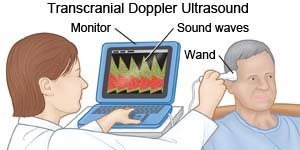Transcranial Doppler Ultrasound
Medically reviewed by Drugs.com. Last updated on Aug 4, 2025.
WHAT YOU NEED TO KNOW:
Transcranial doppler (TCD) ultrasound is a test that uses sound waves to measure blood flow in your brain. It shows the speed and direction of blood through the blood vessels. It may also show how the blood vessels react to medicines or position changes.
HOW TO PREPARE:
You or a close family member will be asked to sign a legal document called a consent form. It gives healthcare providers permission to do the procedure or surgery. It also explains the problems that may happen, and your choices. Make sure all your questions are answered before you sign this form.
Before the test:
Tell your healthcare provider what medicines you take. Also tell him or her if you have diabetes, COPD, emphysema, or any other lung condition. Tell him or her if you smoke or have high blood pressure. These factors may affect your test results.
WHAT WILL HAPPEN:
- TCD is performed on the outside of your head. Your healthcare provider will place gel on the tip of the TCD probe. He or she will gently move the probe across your temple, neck, eyelid, chin, or ear. He or she may hold the probe during a test, or secure it in place to monitor you during the test. Your healthcare provider may ask you to change positions to increase or decrease the blood flow in your brain. You may be asked to lie down, squat, sit, or stand during this test. Your healthcare provider may also ask you to lie on your side, with your chin tucked towards your chest.

- He or she may ask you to open and close your eyes, hold your breath, or breathe heavily. He or she may also ask you to strain as if you are lifting something heavy. You may be given medicine to widen or shrink your blood vessels. Healthcare providers may place blood pressure cuffs on your thighs. These will tighten and loosen around your legs to change your blood pressure. Your healthcare provider may perform activities around you, such as turning on a light. The TCD sound waves appear in patterns on a monitor, showing how your blood vessels respond to these activities.
After the test:
You will be able to go home. Your healthcare provider will follow up with you. You may need this test more than once. You may also need other tests to help healthcare providers learn more about your condition.
CONTACT YOUR HEALTHCARE PROVIDER IF:
You have questions or concerns about your condition or care.
Risks
You may be at risk for an infection if TCD is done near your eyes or open wounds.
Related medications
Care Agreement
You have the right to help plan your care. Learn about your health condition and how it may be treated. Discuss treatment options with your healthcare providers to decide what care you want to receive. You always have the right to refuse treatment.© Copyright Merative 2025 Information is for End User's use only and may not be sold, redistributed or otherwise used for commercial purposes.
The above information is an educational aid only. It is not intended as medical advice for individual conditions or treatments. Talk to your doctor, nurse or pharmacist before following any medical regimen to see if it is safe and effective for you.
Further information
Always consult your healthcare provider to ensure the information displayed on this page applies to your personal circumstances.
